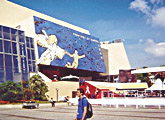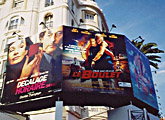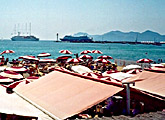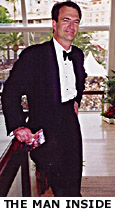
| Notes
From Cannes Art and Commerce on the Riviera by Don Thompson |
|
I went to Cannes with films to sell and projects to pitch. I was there with Rick, my friend and filmmaking partner, and a solid director-producer in his own right. Rick and I (another hyphenated professional) walked up and down the Croissette with our portfolio of completed films and projects in development. We ate a lot of great meals, attended gala competition screenings (along with a Director's Fortnight screening), drank cocktails at private receptions with filmmaking notables, and dropped in on a couple of panel discussions sponsored by the IFP (Independent Feature Project). We also met with some Europeans and their companies who seemed legitimately interested in a balance of art and commerce -- in short, my kind of people.
The support for filmmakers is palpable, etched in the salty air and the silky Mediterranean Sea. While in the U.S. you sometimes feel like a child molester if you have any interest in filmmaking as an art, in Europe it's still OK to be an artist, probably because the governments subsidize filmmakers, mostly in an effort to hold back the American hegemony (Hollywood) and its tendency to overpower local culture, like The Borg in Star Trek. The mood of the Cannes market was reportedly more subdued than in the past several years. Like the stock market and the world economy in general, the independent film production industry is experiencing a bust after the boom. Bankers who formerly offered hefty "gap loans" based on foreign presales (the Banks would provide funding with as little as 40% of the films rights presold to foreign markets) had dried up, "product" was harder to finance, and, according to an executive at Artisan, this was "the worst market I've seen in my life." Foreign presale deals were a fraction of what was seen a couple of years before. Producers were scrambling for the best deals they could find and often coming up short. But for me, the mood was far from depressing, because there's always the screenings.
The two competition screenings we attended were DreamWorks' animated feature Spirit and P.T. Anderson's Punch Drunk Love starring Adam Sandler and Emily Watson. The third film (in the Director's Fortnight) was Nada by Cuban director Juan Carlos Cremata Malberti. The three films (by no planning of mine) somehow reflected the panorama of film from the Americas -- ranging from the politically correct to the profane and the poetic. Spirit, the story of a "unbreakable" mustang who can't be tamed by the Calvary or the Indians, is all warm and fuzzy, and makes you nostalgic for an America that never existed. Ideals of the American West are sentimentalized and sanitized in a kind of Hallmark fashion, making everyone feel good about themselves and how socially progressive Hollywood studio filmmaking can be -- all without upsetting anybody too much. After all, most of the Anglo Saxons the film protests against are long gone (the film takes place in the Old West), and now (of course) we have the reformed White Males in charge, who only care about the welfare of everyone (wink, wink). Capitalism is reformed, even though you might not be able to convince the Chinese workers who die from 16 hour, seven day work schedules in order to make cuddly little toys for American kids -- probably toys that look a lot like the characters in Spirit. Chinese labor aside, Spirit ostensibly will teach Western kids (or any kid) the value of creative individualism, at least until they to college, where a film like Punch Drunk Love shows them how fucked up things really are, with all the adolescent rage of the White Angry Male ready to burst out onto the world and destroy them, should they get in its way. It was Anderson's film that showed America the Angry -- full of rage at itself and expressed through an Angry White Male who finds himself assaulted on all sides by pornographers and crazy siblings, and seeks the solace of an understanding (European) female who isn't consumer crazed and demanding he be like some advertisement he can never attain. The film's protagonist, Barry Egan (Adam Sandler), finds himself captive of a phone sex worker who demands his money and threatens his peace of mind through the various thugs and pimps she sets loose to prey on him. In tandem, Barry seeks solace in the arms of one of his sister's friends (Emily Watson), who ultimately gets caught up in Barry's dilemma.
The third film, Nada (dir. Juan Carlos Cremata Malberti), is a kaleidoscopic film of epic ambition and passion, the first Cuban film at Cannes in over 20 years. Nada's protagonist seeks to emigrate to the U.S., but doesn't see this country the way P.T. Anderson does. To her, going to the U.S. is like winning the Lotto -- she would be set for life. In turns funny, poetic and satirical, Nada posits the life of a postal worker who sends letters to the Cuban populace in an attempt to heal their pain. A kind of post office Madonna (not the modern one), the woman is also communicating with her parents in the U.S., and attempting to gain permanent entry to the U.S. In tandem, she begins a love affair with a younger man (another postal worker) and ultimately decides to stay behind with him, rejecting the offer for a new life in the U.S. The film has poetic sensibilities and little plot, which is refreshing, but drove the (hip looking) moralists out of the theater, although most stayed. By creating the cinematic equivalent of chaos theory, the filmmaker allows for poetic breaks that touch on something transcendent. Plot is thrown out, replaced by the moment, although many people don't like the beauty the moment has to offer, and would rather wallow in sentiment or the well-trod cliché or, better, nameless violence. Nada offers a kind of frenetic narrative experiment, by a filmmaker displaying signs of mastery even with his first film, in that he has grappled with his passion and revealed it without inhibition, much like he showed up on the stage of the theater to take a picture of himself with the audience so he could send it back to his mother. No need to be cool. The urgency to express fueled him and his filmmaking.
But in Cannes, among the French watching Tati on screens assembled by the festival on the beach, and the open air, the bare breasted sun bathers, and the wine, there in Cannes any indications of despair are forgotten, and there is still somehow hope. Somehow we'll survive it all, and great films will continue to get made.
-- Don Thompson Don
Thompson is a filmmaker/producer and co-founder of SolPix. You can
find out more about Don by going to the website for his production
company nextpix.
You can also email him at don@nextpix.com |

| |
 |
Euro Screen Writers Articles on Euro film, research, plus a great cache of interviews with such directors as Godard, Besson, Agnieszka Holland, Peter Greenway, and Fritz Lang. |
 |
Done Deal: A current list of the latest industry script sales. |
 |
UK's Film Unlimited Truly unlimited, one of the best film sites going. Plenty of news, reviews, special reports, features, and PREVIEWS. |
 |
Screen Writer's Utopia! What are they, who wrote them, who's doing them, and what you can expect. |
 At
Cannes there is a unique form of democracy and support for filmmakers
of all stripes. Democracy at Cannes means that anyone (with a ticket)
can walk up the red carpet, past the military on parade and saunter
right up to the Palaise entrance like any movie star. It's a "glamour
for everybody" brand of democracy -- suitably French. While American
egalitarianism seeks to coerce everyone into Big Mac world, the
French want everyone to fulfill their individual potential and become
enlightened (and drink a little wine in the process). This is why
they like the Buddhists so much in France, who share a similar vision
of Enlightenment, although of a different stripe (and less wine).
At
Cannes there is a unique form of democracy and support for filmmakers
of all stripes. Democracy at Cannes means that anyone (with a ticket)
can walk up the red carpet, past the military on parade and saunter
right up to the Palaise entrance like any movie star. It's a "glamour
for everybody" brand of democracy -- suitably French. While American
egalitarianism seeks to coerce everyone into Big Mac world, the
French want everyone to fulfill their individual potential and become
enlightened (and drink a little wine in the process). This is why
they like the Buddhists so much in France, who share a similar vision
of Enlightenment, although of a different stripe (and less wine).
 Michael
Moore's Bowling for Columbine was the talk of the festival.
Moore's documentary reveals the U.S. "guns and violence" culture,
and, at least according to another director on the IFP "American
directors at Cannes" panel, seemed to make any U.S. citizens in
the audience uncomfortable. Apparently the French were agreeing
with Moore's assessment of American culture as violence obsessed
-- violence spawned to a large extent by (according to the Moore)
"a violent economic system." Moore's film set the stage for first
Cannes post September 11, and the festival openly embraced his unique
form of cultural criticism. United Artists apparently picked up
Moore's film for 3 million. So like the 60's rock stars, protest
and profit often still go hand in hand.
Michael
Moore's Bowling for Columbine was the talk of the festival.
Moore's documentary reveals the U.S. "guns and violence" culture,
and, at least according to another director on the IFP "American
directors at Cannes" panel, seemed to make any U.S. citizens in
the audience uncomfortable. Apparently the French were agreeing
with Moore's assessment of American culture as violence obsessed
-- violence spawned to a large extent by (according to the Moore)
"a violent economic system." Moore's film set the stage for first
Cannes post September 11, and the festival openly embraced his unique
form of cultural criticism. United Artists apparently picked up
Moore's film for 3 million. So like the 60's rock stars, protest
and profit often still go hand in hand.
 Anderson's
film doesn't appeal to any particular audience as it straddles to
balance Sandler's frat boy persona with something deeper -- but
we're not sure what that something deeper is. I do know that the
film is about rage, and the difficulty of connecting in a world
gone mad, of creating human connections in an American culture so
obsessed with selling everything -- even intimacy -- that every
human interaction becomes suspect. According to Anderson's vision,
the only way to resolve this mental pollution is to rise up against
it in a rage
Anderson's
film doesn't appeal to any particular audience as it straddles to
balance Sandler's frat boy persona with something deeper -- but
we're not sure what that something deeper is. I do know that the
film is about rage, and the difficulty of connecting in a world
gone mad, of creating human connections in an American culture so
obsessed with selling everything -- even intimacy -- that every
human interaction becomes suspect. According to Anderson's vision,
the only way to resolve this mental pollution is to rise up against
it in a rage During
the day, Rick and I walked through the booths and the hotels of
the Croissette, seeking friends. Some were found. Mostly European,
mostly those that somehow believe that film can be something other
than merely profitable. The meetings went well, with the promise
of follow-up and potential distribution deals, and real interest
in the kind of films we're developing. I pushed my own particular
bent for "humanistic media" -- a banner which has often got me into
trouble in the U.S., whose independent film movement in on the ropes,
seeking direction, seeking "a market" -- often a genre market. Let's
hope that individual voices can continue to arise from a world dominated
by Spiderman. The signs often don't look so good.
During
the day, Rick and I walked through the booths and the hotels of
the Croissette, seeking friends. Some were found. Mostly European,
mostly those that somehow believe that film can be something other
than merely profitable. The meetings went well, with the promise
of follow-up and potential distribution deals, and real interest
in the kind of films we're developing. I pushed my own particular
bent for "humanistic media" -- a banner which has often got me into
trouble in the U.S., whose independent film movement in on the ropes,
seeking direction, seeking "a market" -- often a genre market. Let's
hope that individual voices can continue to arise from a world dominated
by Spiderman. The signs often don't look so good.
